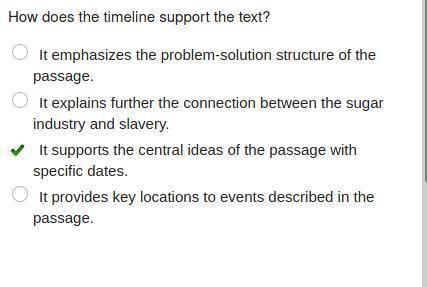Read the passage from Sugar Changed the World.
I wanted to know more about the beguiling...

English, 10.03.2020 04:47 jgcugucgucg
Read the passage from Sugar Changed the World.
I wanted to know more about the beguiling Nina, and my cousin had plenty of stories to share. He told me that her grandfather was a Russian serf—a farmer who could be bought and sold by the noble who owned his land. Family legend has it that this serf, a remarkable and intelligent man, helped to change the course of the history of sugar. In the early 1800s, the British controlled most of the sugar plantations of the Caribbean and the sea routes to Europe. As a result, their rivals were desperate to find a new way to create sugar. They turned to beets.
We don't know exactly what Nina's grandfather's invention did, but as the story goes, he found a way to give raw beet sugar sparkling hues. People from Russia to the cafés of Vienna could now buy cheap and attractive sugar produced on European soil.
Serfs were much like slaves, since they had no choice about where they lived or worked. Yet Nina's grandfather made so much money from his invention that he was able to buy his freedom from his owner. He went on to become a very rich man—so rich, he not only bought a piece of land on the Volga River but married off his daughter to a noble who owned the next stretch of river lands. Together they could form a kind of mini empire, controlling a large swath of this important waterway, and they became the first family in the area to buy an automobile. . . .
Age of Science
1747 Andraeas Marggraf discovers that beet sugar is identical to cane sugar
1840s Beets become a major crop in Ukraine
1852 Indians begin to arrive in Natal to work in sugar
1861 Czar Alexander II frees Russia’s serfs
How does the timeline support the text?
It emphasizes the problem-solution structure of the passage.
It explains further the connection between the sugar industry and slavery.
It supports the central ideas of the passage with specific dates.
It provides key locations to events described in the passage.

Answers: 3


Another question on English

English, 21.06.2019 14:30
"this is just to say" by william carlos williams, which of these poetic devices does this poem most represent?
Answers: 3

English, 21.06.2019 20:00
If a sentence is a run-on, correct it. if it is correct as written, write correct. 1.)i looked down. i saw that the well was apparently dry. 2.)we read the preamble to the constitution, our group felt anew the power of those words. 3.)the boy had trouble with the decimal point when multiplying he always put it in the wrong place. 4.)the thermometer broke, the mercury spilled onto the floor. 5.)i mislead my car keys, my house keys were also gone. 6.)it is against the law litter, neveretheless, people do it. 7.)ann threw away the check, but she eventually recovered it. 8.)i generally like the climate of the area where i live i do not enjoy subfrezzing winter temperatures. 9.)everyone should be polite, however many people are rude. 10.)i made my own chili to eat it one needs an iron stomach.
Answers: 1

English, 21.06.2019 22:00
Must read story will give if ! in “perseverance,” which theme is reflected in the lines, “life’s field will yield as we make it / a harvest of thorns or of flowers”? a: life is a field in which flowers and thorns will grow. b: accept what you are given, because you cannot change it. c: your life is the result of the work you put into it. d: working together people achieve their goals in life.
Answers: 2

English, 21.06.2019 23:30
Why do you think frank tashlin titled this story the bear that wasn’t? why didn’t the factory officials recognize the bear for what he was? why did it become harder and harder for the bear to maintain his identity as he moved through the bureaucracy of the factory?
Answers: 1
You know the right answer?
Questions

Mathematics, 26.08.2019 12:50

English, 26.08.2019 12:50

English, 26.08.2019 12:50






Social Studies, 26.08.2019 12:50



Mathematics, 26.08.2019 12:50

Mathematics, 26.08.2019 12:50

Mathematics, 26.08.2019 12:50

Mathematics, 26.08.2019 12:50


English, 26.08.2019 12:50


Social Studies, 26.08.2019 12:50

Chemistry, 26.08.2019 12:50




